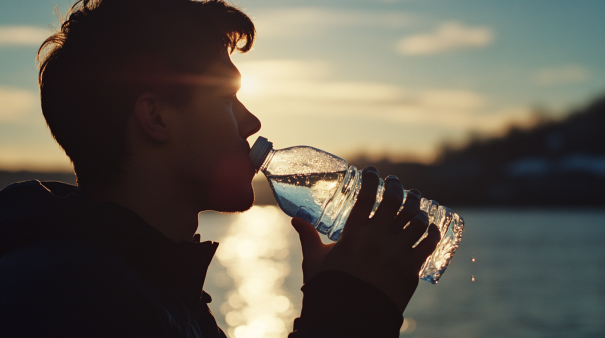Drinking enough water is key for good health. It helps with many body functions, like keeping your body cool and moving nutrients to cells. But figuring out how much water you need can be tricky. It depends on your age, how active you are, and where you live.

In this article, we’ll talk about why staying hydrated is important. We’ll also look at what happens if you don’t get enough water and how to keep drinking water all day.
Key Takeaways
- Water is essential for maintaining vital bodily functions, and proper hydration is crucial for overall health and well-being.
- Dehydration can lead to a range of mild to severe consequences, including fatigue, headaches, and in extreme cases, organ failure.
- Individual water needs are influenced by factors such as age, activity level, and climate, and can vary widely from person to person.
- Recommended daily water intake can range from 6 to 8 cups for healthy adults, but the exact amount may need to be adjusted based on individual circumstances.
- Staying hydrated throughout the day by carrying a reusable water bottle and incorporating water-rich foods can help you meet your body’s hydration needs.
Understanding the Importance of Proper Hydration
Staying hydrated is key for your health and well-being. Water is vital for the body to function right. It helps with many important tasks, like keeping your body temperature in check and moving nutrients around. Water is essential for your body to work well.
The Role of Water in Vital Bodily Functions
Water makes up about 60% of our body weight. It’s involved in many vital bodily functions. It keeps your body temperature stable, helps with digestion, and carries nutrients and oxygen around. Drinking enough water is also key for your cognitive function, mood, and energy.
Consequences of Dehydration: From Mild to Severe
Not drinking enough water can lead to dehydration. This can cause fatigue, headaches, and muscle cramps. If it gets worse, it can cause organ damage, heat-related illnesses, and even life-threatening complications. It’s important to watch for signs of dehydration and drink water to avoid these risks.
- Proper hydration is key for overall health and well-being.
- Water is crucial for keeping your body temperature stable, moving nutrients, and helping organ function.
- Not drinking enough water can cause dehydration, leading to mild to severe symptoms and health complications.
the importance of hydration how much water do you really need
Drinking enough water is key to staying healthy and feeling good. Water helps with many body functions, like keeping your temperature right and helping with digestion. But, how much water should you drink every day is a common question.
The amount of water you need changes based on your age, how active you are, and your health. Generally, adults should try to drink 11.5 to 15.5 cups (2.7 to 3.7 liters) of water daily. This total includes water from drinks and the food you eat.
Wondering how to figure out your water needs? Think about these things:
- Climate and environment: If it’s hot or humid where you live, or if you’re very active, you might need more water.
- Age and health: Older people and those with certain health issues might need more water to stay hydrated.
- Pregnancy and breastfeeding: Women who are pregnant or breastfeeding need more water to support their baby and milk production.
Being hydrated isn’t just about drinking water. Eating foods with a lot of water, like fruits and veggies, also helps. Listen to your body and adjust your water intake to meet your needs.
Factors Influencing Individual Water Needs
How much water you need daily can change a lot. Knowing what affects your water intake is important for staying hydrated and healthy.
Age and Activity Level
As we get older, our bodies need less water. Older adults don’t need as much as younger, more active people. This is because older people’s bodies don’t control water as well.
Active people who exercise a lot need more water. This is because they lose fluids through sweat.
Climate and Environment
Where you live affects how much water you need. If it’s hot or humid, you might need to drink more water. This is because you lose more fluids when it’s hot.
If you live in a cooler, drier climate, you might not need as much water. Other things like altitude and air circulation also play a role in your water needs. It’s important to listen to your body and adjust your water intake to stay hydrated.
Recommended Daily Water Intake
Finding out how much water to drink daily is key for staying hydrated and supporting health. The amount needed can change based on your individual factors. Yet, there are guidelines to help you stay hydrated and drink enough water.
Health experts suggest adults aim for 6 to 8 cups (48-64 ounces) of water daily. This means about 8 eight-ounce glasses of water each day. But remember, this is a general rule. Your water needs can change due to your age, how active you are, and the climate you’re in.
If you’re very active or live in a hot, humid place, you might need to drink more water. This is because you lose fluids through sweat. Older adults or those with certain health issues might also need more water. Always talk to your doctor to find out how much water you should drink daily.
The main thing is to listen to your body and keep drinking water all day. Carry a water bottle with you and try to drink water often. Don’t wait until you’re thirsty. By drinking enough water, you keep your body hydrated and working well.
Signs of Proper Hydration
Being well hydrated is key for your health and well-being. But how do you know if you’re drinking enough water? A good sign is the color of your urine. If it’s a pale, light yellow, you’re drinking enough water.
If your urine looks dark yellow or amber, you might be dehydrated. Feeling thirsty, having a dry mouth, or feeling tired or getting headaches are also signs. Drinking plenty of water keeps you hydrated by drinking and helps you stay hydrated.
Urine Color as an Indicator
Checking your urine color is an easy way to see if you’re drinking enough water. Here’s what the colors mean:
- Pale or light yellow: You’re well hydrated.
- Dark yellow or amber: You may be experiencing mild dehydration and need to drink more water.
- Bright yellow: This could be a sign of you’re well hydrated, but it may also mean you’re taking certain vitamins or supplements.
Try to keep your urine a nice, light yellow color all day. If you feel thirsty or dehydrated, drink more water. This keeps you hydrated and helps you stay healthy.
Myths and Misconceptions About Water Consumption
Many people believe drinking too much water is a big problem. But, it’s not true. The body is great at keeping water levels balanced. Most folks can safely drink more fluids without any issues.
Some think drinks like soda or sports drinks are as good as water for staying hydrated. But, they’re not. These drinks often have sugar, caffeine, or electrolytes that can mess with your body’s water balance. Water helps keep you hydrated better than other drinks.
- Myth: Drinking too much water can be harmful.
- Fact: The body is highly efficient at regulating water balance, and excess water is rarely a concern for most people.
- Myth: Other beverages are just as hydrating as drinking water.
- Fact: Water is the optimal choice for maintaining proper hydration and supporting vital bodily functions.
Knowing the truth about these myths helps people make better choices about their water intake. This way, they can make sure they’re getting enough to drink to stay healthy.
| Myth | Fact |
|---|---|
| Drinking too much water can be harmful | The body is highly efficient at regulating water balance, and excess water is rarely a concern for most people. |
| Other beverages are just as hydrating as drinking water | Water is the optimal choice for maintaining proper hydration and supporting vital bodily functions. |
Strategies for Staying Hydrated Throughout the Day
Staying hydrated is key for good health. There are easy ways to make sure you drink enough water all day. Carrying a reusable water bottle and eating water-rich foods are two great methods.
Carry a Reusable Water Bottle
Having a reusable water bottle with you is a great way to remember to drink water often. It keeps your water bottle close, so you can sip on plain water all day. This habit helps you stay hydrated and keep your body’s fluids at the right level.
Incorporate Water-Rich Foods
Eating water-rich foods is another way to stay hydrated. Foods like watermelon, cucumbers, and tomatoes are full of nutrients and water. Adding these water-rich foods to your meals and snacks helps keep you hydrated all day.
Using a reusable water bottle and eating water-rich foods together makes a strong plan for staying hydrated. Remember, water is best and water is vital for your health and well-being.
The Role of Other Beverages in Hydration
Water is the top choice for staying hydrated, but other drinks can also help. Sports drinks are great for people who work out a lot. They replace electrolytes lost through sweat. But, watch out for the sugar in these drinks to avoid extra calories.

Caffeinated drinks like coffee and tea can help with hydration too. But, they might make you pee more. So, drink more water to stay hydrated. Sugary drinks like juices and sodas can give you fluids, but their sugar can harm your hydration efforts.
It’s best to drink water first and use other drinks as needed. Adults should aim for 6 to 8 cups of water and other fluids when they’re thirsty. Water is the best choice. By balancing your drinks, you keep your body hydrated and working well.
